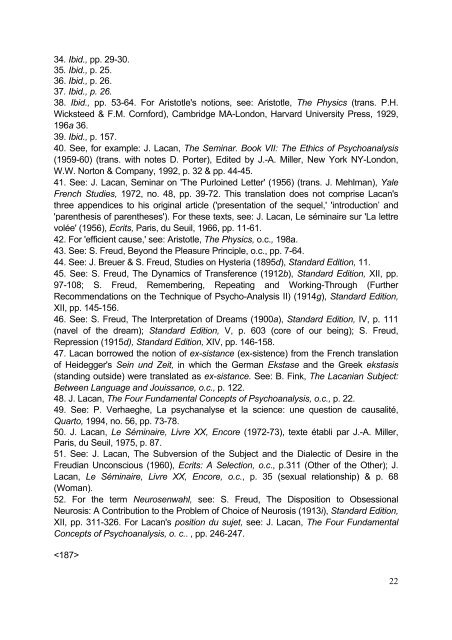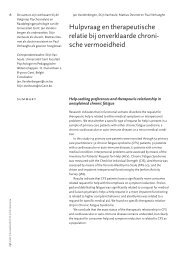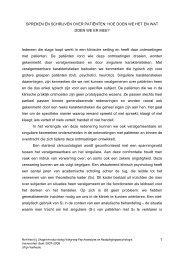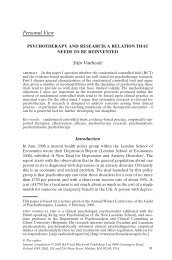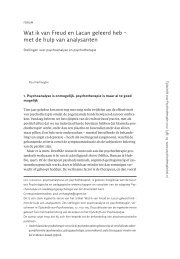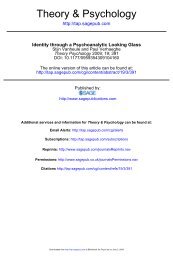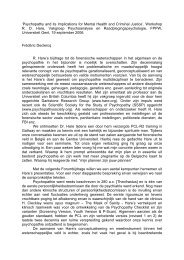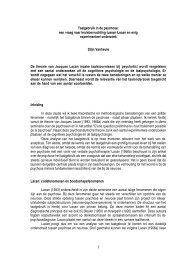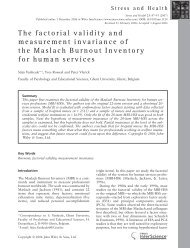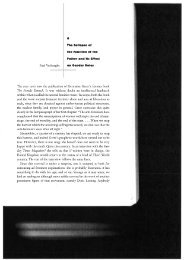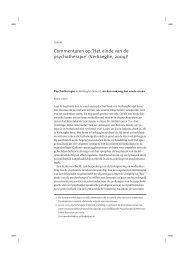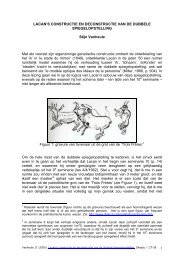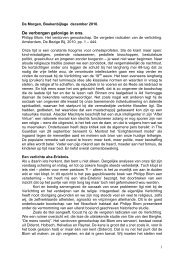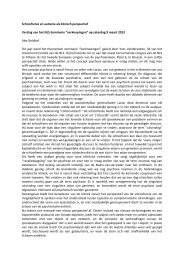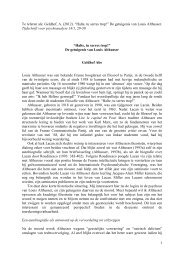34. Ibid., pp. 29-30.35. Ibid., p. 25.36. Ibid., p. 26.37. Ibid., p. 26.38. Ibid., pp. 53-64. For Aristotle's notions, see: Aristotle, The Physics (trans. P.H.Wicksteed & F.M. Cornford), Cambridge MA-London, Harvard University <strong>Pre</strong>ss, 1929,196a 36.39. Ibid., p. 157.40. See, for example: J. Lacan, The Seminar. Book VII: The Ethics <strong>of</strong> Psychoanalysis(1959-60) (trans. with notes D. Porter), Edited by J.-A. Miller, New York NY-London,W.W. Norton & Company, 1992, p. 32 & pp. 44-45.41. See: J. Lacan, Seminar on 'The Purloined Letter' (1956) (trans. J. Mehlman), YaleFrench Studies, 1972, no. 48, pp. 39-72. This translation does not comprise Lacan'sthree appendices to his original article ('presentation <strong>of</strong> the sequel,' 'introduction’ <strong>and</strong>'parenthesis <strong>of</strong> parentheses'). For these texts, see: J. Lacan, Le séminaire sur 'La lettrevolée' (1956), Ecrits, Paris, du Seuil, 1966, pp. 11-61.42. For 'efficient cause,' see: Aristotle, The Physics, o.c., 198a.43. See: S. Freud, Beyond the Pleasure Principle, o.c., pp. 7-64.44. See: J. Breuer & S. Freud, Studies on Hysteria (1895d), St<strong>and</strong>ard Edition, 11.45. See: S. Freud, The Dynamics <strong>of</strong> Transference (1912b), St<strong>and</strong>ard Edition, XII, pp.97-108; S. Freud, Remembering, Repeating <strong>and</strong> Working-Through (FurtherRecommendations on the Technique <strong>of</strong> Psycho-Analysis II) (1914g), St<strong>and</strong>ard Edition,XII, pp. 145-156.46. See: S. Freud, The Interpretation <strong>of</strong> Dreams (1900a), St<strong>and</strong>ard Edition, IV, p. 111(navel <strong>of</strong> the dream); St<strong>and</strong>ard Edition, V, p. 603 (core <strong>of</strong> our being); S. Freud,Repression (1915d), St<strong>and</strong>ard Edition, XIV, pp. 146-158.47. Lacan borrowed the notion <strong>of</strong> ex-sistance (ex-sistence) from the French translation<strong>of</strong> Heidegger's Sein und Zeit, in which the German Ekstase <strong>and</strong> the Greek ekstasis(st<strong>and</strong>ing outside) were translated as ex-sistance. See: B. Fink, The Lacanian Subject:Between Language <strong>and</strong> Jouissance, o.c., p. 122.48. J. Lacan, The Four Fundamental Concepts <strong>of</strong> Psychoanalysis, o.c., p. 22.49. See: P. Verhaeghe, La psychanalyse et la science: une question de causalité,Quarto, 1994, no. 56, pp. 73-78.50. J. Lacan, Le Séminaire, Livre XX, Encore (1972-73), texte établi par J.-A. Miller,Paris, du Seuil, 1975, p. 87.51. See: J. Lacan, The Subversion <strong>of</strong> the Subject <strong>and</strong> the Dialectic <strong>of</strong> Desire in theFreudian Unconscious (1960), Ecrits: A Selection, o.c., p.311 (Other <strong>of</strong> the Other); J.Lacan, Le Séminaire, Livre XX, Encore, o.c., p. 35 (sexual relationship) & p. 68(Woman).52. For the term Neurosenwahl, see: S. Freud, The Disposition to ObsessionalNeurosis: A Contribution to the Problem <strong>of</strong> Choice <strong>of</strong> Neurosis (1913i), St<strong>and</strong>ard Edition,XII, pp. 311-326. For Lacan's position du sujet, see: J. Lacan, The Four FundamentalConcepts <strong>of</strong> Psychoanalysis, o. c.. , pp. 246-247.22
53. For the time-structure <strong>of</strong> the future anterior. see: J. Lacan, The Function <strong>and</strong> Field <strong>of</strong>Speech <strong>and</strong> Language in Psychoanalysis, o.c., p. 86.54. J. Lacan, The Four Fundamental Concepts <strong>of</strong> Psychoanalysis, o.c., p. 203.55. In his metapsychological papers, Freud uses different denominations (vesicle,primitive organism, early ego, primitive mental apparatus) to underscore the primarycharacter <strong>of</strong> the mental apparatus. See: S. Freud, Instincts <strong>and</strong> their Vicissitudes(1915c), St<strong>and</strong>ard Edition XIV , pp. 117-140; S. Freud, Negation, o.c., pp. 233-239; J.Lacan, The Four fundamental Concepts <strong>of</strong> Psychoanalysis, o.c., pp. 240-241.56. For the character <strong>of</strong> Hannibal Lecter, see: T. Harris, Red Dragon (1981), London,Arrow Books, 1993; T. Harris, Silence <strong>of</strong> the Lambs (1989), London, Arrow Books, 1991.57. For Lacan's critique on the 'two body psychology,' see: J. Lacan, The Seminar. BookI: Freud's Papers on Technique (1953-54) (trans. with notes J. Forrester), Edited by J.-A. Miller, Cambridge, Cambridge University <strong>Pre</strong>ss, 1988, pp. 11, 205, 220, 227 & 261; J.Lacan, The Function <strong>and</strong> Field <strong>of</strong> Speech <strong>and</strong> Language in Psychoanalysis, o.c., p.90.Lacan introduces the topological figures <strong>of</strong> the Moebius strip <strong>and</strong> the Klein bottle fromhis ninth seminar onwards: J. Lacan, Le Séminaire IX, L’identification (1961-62),unpublished.58. J. Lacan, The Seminar. Book I: Freud's Papers on Technique, o.c., p. 171.59. J. Lacan, The Seminar. Book I: Freud's Papers on Technique, o.c., p..146 ('Man'sdesire is the desire <strong>of</strong> the other'); J. Lacan, The Seminar. Book III The Psychoses (1955-56) (trans. with notes R. Grigg), Edited by J.-A. Miller, New York NY, W.W. Norton &Company, 1993, p. 112 ('The unconscious is the discourse <strong>of</strong> the Other’); J. Lacan, TheFunction <strong>and</strong> Field <strong>of</strong> Speech <strong>and</strong> Language in Psychoanalysis, o.c., p. 71 (The HollowMen); T.S. Eliot, The Hollow Men (1925), Collected Poems 1909-1962, London-BostonMA, Faber <strong>and</strong> Faber, 1974, pp. 87-92.60. This is not only the basis <strong>of</strong> suggestion, but <strong>of</strong> id<strong>entity</strong> as such: Je est un autre (I isan other). In this sense, Lacan extends Freud's ideas to their very limits. What Freuddescribes in Group Psychology <strong>and</strong> the Analysis <strong>of</strong> the Ego concerning the individualmembers <strong>of</strong> a group taking their id<strong>entity</strong> from the leader in the position <strong>of</strong> Other, isgeneralised by Lacan to id<strong>entity</strong> as such. Hence, the possibility <strong>of</strong> brain-washing,whereby a particular set <strong>of</strong> signifiers, belonging to a particular other, is replaced in thesubject by another set <strong>of</strong> signifiers. This is the neurotic counterpart <strong>of</strong> the 'as if'-personality, described by Helene Deutsch. See: J. Lacan, The Seminar. Book II: TheEgo in Freud's Theory <strong>and</strong> in the Technique <strong>of</strong> Psychoanalysis (1954-55) (trans. S.Tomaselli, notes J. Forrester), Edited by J.-A. Miller, Cambridge, Cambridge University<strong>Pre</strong>ss, 1988, p. 7 (I is an other); S. Freud, Group Psychology <strong>and</strong> the Analysis <strong>of</strong> theEgo (1921c), St<strong>and</strong>ard Edition, XVIII, pp. 65-143; H. Deutsch, Über einen Typus derPseudoaffektivität, ('als ob'), Internationale Zeitschrift für Psychoanalyse, 1934, XX, pp.323-335; H. Deutsch, Some Forms <strong>of</strong> Emotional Disturbance <strong>and</strong> their Relationship toSchizophrenia, in J.D. Sutherl<strong>and</strong> & M. Masud, R. Khan (Eds.), Neuroses <strong>and</strong> CharacterTypes: Clinical Psychoanalytic Studies, London, The Hogarth <strong>Pre</strong>ss <strong>and</strong> the Institute <strong>of</strong>Psycho-Analysis, 1963, pp. 262-281.61. See: J. Lacan, Le Séminaire, Livre VIII, Le transfert (1960-61), texte étabIi par J.-A.Miller, Paris, du Seuil, 1991, pp. 20-22.23


